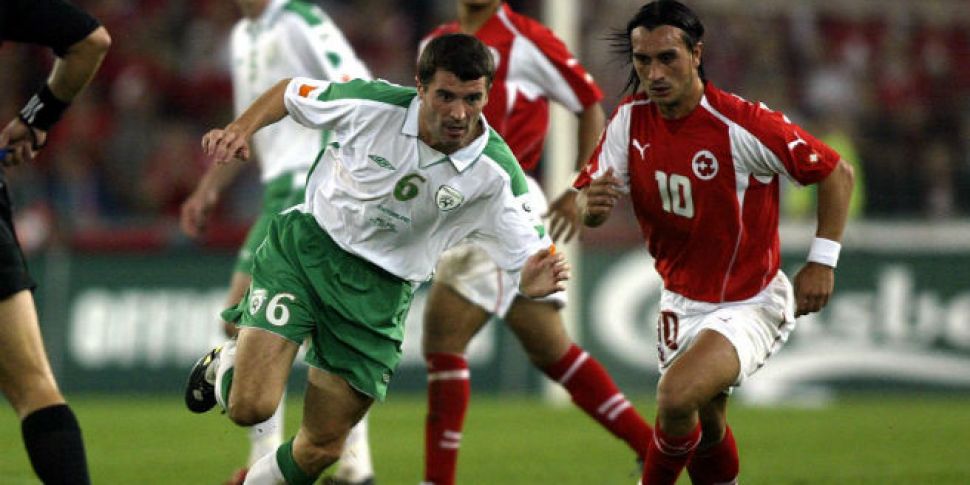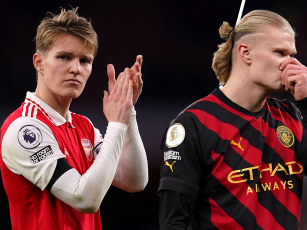According to the FIFA rankings at least, Ireland and Switzerland were punching well above their weight at world level in the early '90s.
In August 1993, Roy Hodgson's Swiss reached a peak of third, while Jack Charlton's Boys in Green reached an all-time high of sixth all in the same month.
Both sides would reach the same last-16 stage at the following year's World Cup in the USA, where the Swiss would lose 3-0 to Spain as we fell short against the Dutch.
However, it was Ireland under Mick McCarthy who managed to maintain a respectable level in international football for the next decade as we qualified for one more World Cup and reached the playoff for major tournaments.
Switzerland, on the other hand, would qualify for Euro 1996 but until Euro 2004 they would not reach another major tournament again.
But the qualifiers for Euro 2004 and World Cup 2006 are a transition moment as Ireland and Switzerland were pitched into the same groups.
With a hangover from the events of summer 2002 (it goes without saying Saipan was a factor) for Euro 2004 qualifying, Ireland crashed to a 4-2 loss in Russia in the group opener, before facing the Swiss a month later in October 2002.
It would prove the undoing of McCarthy's tenure as Ireland boss as goals from Hakan Yakin and Fabio Celestini saw Ireland loss 2-1 at Landsdowne Road, putting our qualifying hopes in jeopardy.
With Brian Kerr having stepped in to take over the top job, Ireland then lost 2-0 away to the Swiss with Yakin scoring again and Alexander Frei delivering the coup de grace.

Ireland's L-R: Gary Doherty, Richard Dunne and Steven Reid stand dejected after an October 2005 defeat . Picture by: Adam Davy / EMPICS Sport
Ex-Ireland striker and defender Gary Doherty was our top scorer in that campaign with three goals and on this week's Team 33, he used the first Switzerland game from that qualifying campaign as an example as he mused about reason why Ireland might have underachieved in the post-2002 years.
"I remember the Brian Kerr era. We had a great team," he told us, "We had all Premier League players but I guess other teams were just that little bit stronger than us. I remember losing out in Switzerland one game and probably not many of their players would have got in our team but maybe the fans got them through."
In a group featuring an under-par France side that would later reach the World Cup final, the 2006 qualifying campaign would see us avoid defeat to the Swiss in both games, but it was not enough for Ireland or Kerr.
A 1-1 draw in Switzerland (that man Yakin scored again) in September 2004 and a 0-0 draw at Landsdowne in the final game proved crucial as we settled for fourth, just one point behind the Swiss who pipped Israel to the second place playoff spot.
It was probably the last time, you could consider Ireland and Switzerland to have been on an equal footing as they went on to qualify for every major tournament with the exception of Euro 2012.
The Alpine nation does have a population about double the size of our own, but two things are striking. One is the huge contingent of players in their ranks from immigrant backgrounds, particularly from the Balkans, like Stoke City's Xherdan Shaqiri, Borussia Dortmund's Granit Xhaka and Eintracht Frankfurt's Haris Seferovic. Many other national origins feature in the team from different parts of the globe.
But the other striking aspect of Switzerland's rise to become a second tier football power is the work that has gone in at youth level. On the club scene, the country's biggest club FC Basel have produced a large number of talented players as they regularly qualify for the Champions League.

Switzerland team group photo: Back Row Left-Right: Johan Djourou, Granit Xhaka, Ricardo Rodriguez, Valon Behrami, Haris Seferovic and Yann Sommer. Front Row: Gokhan Inler, Stephan Lichtsteiner, Steve Von Bergen, Admir Mehmedi and Xerdan Shaqiri. Picture by: John Walton / EMPICS Sport
The Guardian's Amy Lawrence also detailed some of the wider changes made in Swiss underage football since the late-90s back in 2010, when she pointed out how they invested over £2 million in youth development and that "they embarked upon a plan to upgrade player development. Around 20% of the seven million population are foreign or have ancestry from outside Switzerland, and they made a concerted effort to recruit the best available boys to play under their flag. A broader pool of talent has become, in many ways, their biggest asset".
Thus, it is no surprise that not only do Switzerland qualify for senior tournaments, but now feature at many major underage tournaments, famously winning the FIFA U17 World Cup in 2009, seven years after becoming European champions at that level.
Ireland, under Brian Kerr, used to qualify for such tournaments and Doherty and Damien Duff spoke to us about being part of those generations and the benefits that had at senior level.
Doherty said: "You get the team bonding quite quickly [through underage international football]. Obviously, Germany do it where they try and bring a lot of players through and something they say over in England is hindering the England team because their top talent don't really play in the underage tournaments. They're kind of just rushed through to the first team tournaments."
Duff had also told Team 33 that not only did our underage success show the quality of player Ireland produced at the time, but that it generated real belief.
"It showed us the quality of player that was coming through back then. We won the U16 and U18 European championship and came third in the World Cup which is unheard of if you look at the state of us now. It gave us that taste, it gave us that belief that we could mix it with the bigger nations," said the former Ireland and Chelsea winger.
Switzerland on the other hand are now ranked 12th best in the world by FIFA and do mix it with the world's best as seen at the 2014 World Cup when Argentina needed an extra-time winner to get past them in the last-16.
Not that FIFA rankings are an accurate gauge of how good an international side really is, but ahead of this Friday's pre-Euro 2016 friendlies, the Swiss are 17 places above us which does illustrate the gap that now exists.
Download the brand new OffTheBall App in the Play Store & App Store right now! We've got you covered!
Subscribe to OffTheBall's YouTube channel for more videos, like us on Facebook or follow us on Twitter for the latest sporting news and content.








